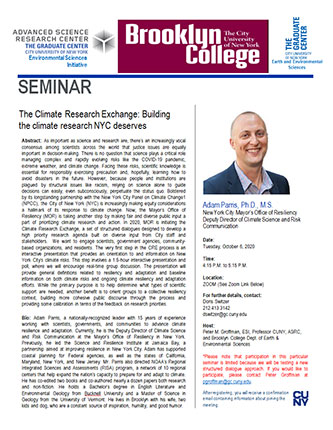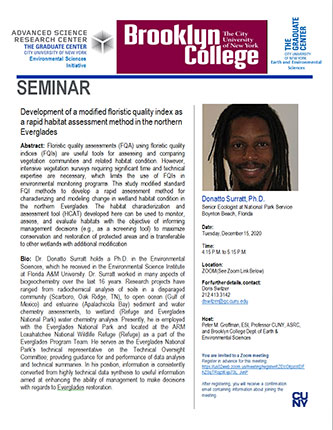Fall 2020
The Fall 2020 Seminar Series is sponsored by:
- Brooklyn College Department of Earth and Environmental Science
- Advanced Science Research Center Environmental Sciences Initiative
- Earth and Environmental Sciences at The Graduate Center
Schedule
- September 15, Monica Palta, Pace University
Accidental Urban Wetlands: Ecosystem Functions in Unexpected Places - October 6, Adam Parris, New York City Mayors Office of Resiliency
The Climate Research Exchange: Building the climate research NYC deserves - October 20, Alan Titus, U.S. Bureau of Land Management
Recent dinosaur findings (tentative title) - November 3, Claire Welty, University of Maryland Baltimore County
Use of groundwater-surface water modeling as an investigative tool in the urban critical zone - November 17, Lindsey Rustad, USDA Forest Service
Hydrologic sensors, real time data, and data visualizations - December 1, Jennifer Cherrier, Brooklyn College
ecoWEIR Tech: a Nature-Based Approach for Integrated Water Management - December 15, Donatto Surratt, U.S. National Park Service
Development of a modified floristic quality index as a rapid habitat assessment method in the northern Everglades

The Climate Research Exchange: Building the Climate Research NYC Deserves
The Climate Research Exchange: Building the Climate Research NYC Deserves
with Adam Parris, Ph.D., M.S., New York City Mayor’s Office of Resiliency, Deputy Director of Climate Science and Risk Communication
Tuesday, October 6, 2020
4:15-5:15 p.m.
*Please note that participation in this particular seminar is limited because we will be testing a new structured dialogue approach. If you would like to participate, please contact Peter Groffman at pgroffman@gc.cuny.edu.
Host: Peter M. Groffman, ESI, Professor CUNY, ASRC, and Brooklyn College Dept. of Earth & Environmental Sciences
As important as science and research are, there’s an increasingly vocal consensus among scientists across the world that justice issues are equally important in decision-making. There is no question that science plays a critical role managing complex and rapidly evolving risks like the COVID-19 pandemic, extreme weather, and climate change. Facing these risks, scientific knowledge is essential for responsibly exercising precaution and, hopefully, learning how to avoid disasters in the future. However, because people and institutions are plagued by structural issues like racism, relying on science alone to guide decisions can easily, even subconsciously, perpetuate the status quo. Bolstered by its longstanding partnership with the New York City Panel on Climate Change1 (NPCC), the City of New York (NYC) is increasingly making equity considerations a hallmark of its response to climate change. Now, the Mayor’s Office of Resiliency (MOR) is taking another step by making fair and diverse public input a part of prioritizing climate research and action. In 2020, MOR is initiating the Climate Research Exchange, a set of structured dialogues designed to develop a high priority research agenda built on diverse input from City staff and stakeholders. We want to engage scientists, government agencies, community-based organizations, and residents. The very first step in the CRE process is an interactive presentation that provides an orientation to and information on New York City’s climate risks. This step involves a 1.5-hour interactive presentation and poll, where we will encourage real-time group discussion. The presentation will provide general definitions related to resiliency and adaptation and baseline information on both climate risks and ongoing climate resiliency and adaptation efforts. While the primary purpose is to help determine what types of scientific support are needed, another benefit is to orient groups to a collective resiliency context, building more cohesive public discourse through the process and providing some calibration in terms of the feedback on research priorities.
Adam Parris, a nationally-recognized leader with 15 years of experience working with scientists, governments, and communities to advance climate resilience and adaptation. Currently, he is the Deputy Director of Climate Science and Risk Communication at the Mayor’s Office of Resiliency in New York. Previously, he led the Science and Resilience Institute at Jamaica Bay, a partnership aimed at improving resilience in New York City. Adam has supported coastal planning for Federal agencies, as well as the states of California, Maryland, New York, and New Jersey. Mr. Parris also directed NOAA’s Regional Integrated Sciences and Assessments (RISA) program, a network of 10 regional centers that help expand the nation's capacity to prepare for and adapt to climate. He has co-edited two books and co-authored nearly a dozen papers both research and non-fiction. He holds a Bachelor’s degree in English Literature and Environmental Geology from Bucknell University and a Master of Science in Geology from the University of Vermont. He lives in Brooklyn with his wife, two kids and dog, who are a constant source of inspiration, humility, and good humor.

Development of a modified floristic quality index as a rapid habitat assessment method in the northern Everglades
Development of a modified floristic quality index as a rapid habitat assessment method in the northern Everglades
with Donatto Surratt, Ph.D., Senior Ecologist at National Park Service, Boynton Beach, Florida
Host: Peter M. Groffman, ESI, Professor CUNY, ASRC, and Brooklyn College Dept. of Earth and Environmental Sciences
Tuesday, December 15, 2020
4:15-5:15 p.m.
via Zoom Registration (After registering, you will receive a confirmation e-mail containing information about joining the meeting.)
Abstract: Floristic quality assessments (FQA) using floristic quality indices (FQIs) are useful tools for assessing and comparing vegetation communities and related habitat condition. However, intensive vegetation surveys requiring significant time and technical expertise are necessary, which limits the use of FQIs in environmental monitoring programs. This study modified standard FQI methods to develop a rapid assessment method for characterizing and modeling change in wetland habitat condition in the northern Everglades. The habitat characterization and assessment tool (HCAT) developed here can be used to monitor, assess, and evaluate habitats with the objective of informing management decisions (e.g., as a screening tool) to maximize conservation and restoration of protected areas and is transferable to other wetlands with additional modification
Bio: Dr. Donatto Surratt holds a Ph.D. in the Environmental Sciences, which he received in the Environmental Science Institute at Florida A&M University. Dr. Surratt worked in many aspects of biogeochemistry over the last 16 years. Research projects have ranged from radiochemical analysis of soils in a disparaged community (Scarboro, Oak Ridge, TN), to open ocean (Gulf of Mexico) and estuarine (Apalachicola Bay) sediment and water chemistry assessments, to wetland (Refuge and Everglades National Park) water chemistry analysis. Presently, he is employed with the Everglades National Park and located at the ARM Loxahatchee National Wildlife Refuge (Refuge) as a part of the Everglades Program Team. He serves as the Everglades National Park’s technical representative on the Technical Oversight Committee; providing guidance for and performance of data analysis and technical summaries. In his position, information is consistently converted from highly technical data synthesis to useful information aimed at enhancing the ability of management to make decisions with regards to Everglades restoration.






